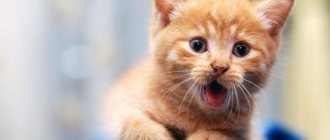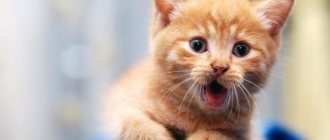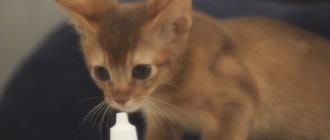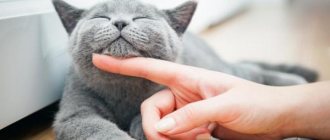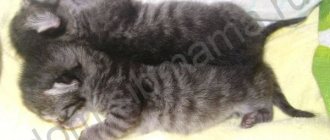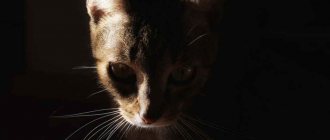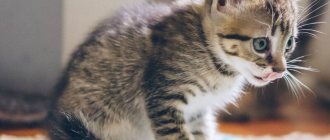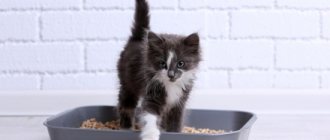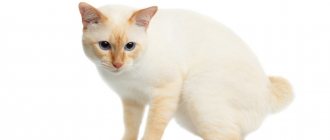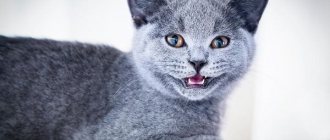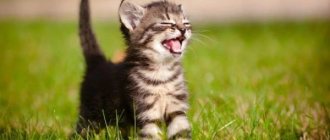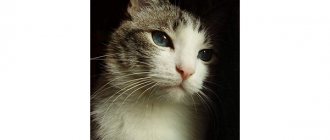Today, almost every person has pets.
The most graceful of them are cats and female cats. Taking care of your pets from a very early age, you may encounter some problems. When the baby is active, eats well, and has a healthy appearance, the owner should not worry. But not all owners know what to do if a small kitten does not eat well, looks exhausted and lethargic.
The dangers of not enough food for a kitten
An adult cat is able to survive for a long time without food or get by with a minimum of it. But for a small animal, nutritional deficiency can lead to serious problems. If a kitten does not eat anything or eats very little and poorly, this is fraught with:
- gastrointestinal diseases;
- anemia;
- pathologies of the liver and kidneys;
- breathing disorders;
- heart rhythm disturbances;
- developmental and growth retardation.
Of course, these complications occur when the animal eats poorly and eats little for quite a long time.
It happens that appetite disappears for just a few days, and then returns to normal. But if the kitten is thin and has not been eating well for a week or more, it’s time to sound the alarm.
© shutterstock
Bad food
When an animal does not eat dry food well, sometimes the reason lies in the quality of the product itself. Perhaps it is not tasty enough or spoiled. Cats are obligate carnivores and are most attracted to meat, so it is important to choose food with a high content of it. Acana and Orijen diets consist of 75–85% meat ingredients and other animal products (fish, eggs, innards). This is an excellent choice both for raising kittens and for maintaining the body of an adult cat.
Don't forget that even the highest quality food can be spoiled if it is expired or stored incorrectly. Cats, like other animals, have an innate ability to distinguish healthy and safe food from harmful and inedible food. If the fats in the food have oxidized, a person may not feel it, but the kitten will not eat such food, and rightly so. The owner will have to purchase fresh packaging of food and store it properly in the future.
Possible diseases
In addition to completely harmless reasons, there are also those that are worth worrying about. We are talking about possible diseases of the pet. There are several options for what ailments can torment your furry friend:
- problems with teeth and oral cavity;
- indigestion;
- inflammation or wound.
Any healthy animal is easy to distinguish from a sick one. As a rule, cats suffering from the disease have decreased appetite, increased drowsiness and increased body temperature. There are also symptoms for which it is very important to consult a veterinarian.
Problems with teeth and oral cavity
Cats of any age are susceptible to this type of disease. Sometimes it is not so easy to determine what is tormenting your pet in the early stages of the disease. At first, the animal may simply refuse to eat, which the owner will explain as a slight change in mood, but if there is no appetite for a long time, you should pay attention to other symptoms.
Pets who have contracted an oral disease lose interest in food, because chewing food becomes painful or unpleasant. Usually such ailments are associated with plaque on the teeth. The cat's gums become inflamed, which causes him discomfort. Also one of the symptoms is bad breath and increased salivation.
Not only can a pet lose a fair amount of weight due to a long hunger strike, but it can also lose teeth if you do not consult a veterinarian in time. Therefore, it is better for the owner to more closely monitor the behavior of his beloved furry if he does not want to eat for a long time.
Digestive disorders
Cats often pick up various kinds of garbage they like from the floor, find food lying around in the most secluded corners of the home and taste it, and also swallow a lot of their own hair while licking themselves. It is not surprising that after such tastings, animals experience discomfort, heaviness and, possibly, even stomach pain, which is why they cannot eat normally.
Intestinal problems can be caused by insufficient water intake or stress. It won’t be difficult to spot problems in your cat’s health. He will vomit, possibly belching, diarrhea or constipation, flatulence and weakness. Eating in this state is out of the question.
Inflammations and wounds
The cat may experience discomfort both from internal inflammatory processes and from external damage. To find out if there is inflammation, you can measure body temperature, pulse and other indicators. If they differ from normal, and the cat does not eat and is not as active as always, you should immediately contact a veterinarian.
Dangerous symptoms
If a small kitten does not eat anything, constantly meows and does not play because it is in a different environment, there is nothing dangerous in such a situation. As soon as the baby gets used to it, sniffs and gets to know all the family members, he will calm down, and his appetite will certainly return soon. It’s another matter when the cub feels bad for unknown reasons. If any dangerous disease develops in the body, in addition to lack of appetite, other pathological symptoms will also bother you:
- increased body temperature;
- copious discharge from the nose and eyes;
- increased salivation;
- repeated vomiting;
- diarrhea or constipation, bloating, pain when pressing on the abdomen;
- refusal of water;
- blanching of the mucous membrane;
- presence of foreign matter in feces;
- lethargy, drowsiness, while the cat does not get up all day.
Return to contents
Causes of decreased appetite
There are quite a few factors that provoke a decrease in appetite in kittens. Some can be easily eliminated, while others are difficult to treat even in a clinical setting. Here are the main reasons:
- the animal eats poorly because the food does not suit it;
- decreased appetite is caused by changes in weather or living conditions (a kitten may not eat due to stress, just like a person);
- the owners overfeed the pet, and it protests, showing poor appetite;
- the baby doesn’t get enough attention or play and is sad, feeling bad “morally”;
- an infection has entered the body;
- there is any disease of the gastrointestinal tract, so the kitten refuses to eat;
- the animal eats little due to food poisoning.
If the kitten begins to eat poorly, you definitely need to figure out why. Often you cannot do this on your own. In this case, a veterinarian will help.
In fact, the kitten eats not so bad
Often, owners only think that the animal is not eating enough. In reality, the whole point is that the baby’s needs are small. Calculate the daily feeding amount for your pet and see if he eats it. For Acana and Orijen feeds, the daily dosages are as follows:
- 60 grams per 1 kg of weight when the kitten has not yet reached the age of 20 weeks;
- 30 grams per 1 kg of weight - after 20 weeks (during this period, kittens no longer grow so intensively).
Upon reaching 12 months, the cat is considered an adult and should eat in accordance with the general norm.
What to do if a small kitten cannot eat and drink on its own?
It happens that a little purr is separated from its mother cat too early. Experienced breeders of purebred animals give the kitten to new owners no earlier than 3 months of age, when it already knows how to eat on its own and is accustomed to a certain food. If the kitten was taken away from the cat when it was very tiny or the baby was simply found on the street, it is likely that he simply has not yet eaten anything other than his mother’s milk. The baby doesn't know how to lap from a bowl. Moreover, he has no habit of drinking water.
Such a cat will have to be fed milk from a pipette or bottle with a nipple. Moreover, it is recommended to use a special cat's milk substitute. Then you can gradually teach the kitten to lap from the bowl and eat wet food. A good way is to offer the baby food from your hand, sometimes this helps kittens start eating new food.
No habit of dry food
If your kitten has never tried dry food before, he will probably be suspicious of such food. Wet food from bags and natural food smell more intensely in comparison with dry granules, which predetermines the pet's preferences. Soaking with warm water can be a way out. This way the granules acquire a more pronounced meat aroma and a consistency familiar to the baby.
If this does not help, you can initially mix dry food with wet food, increasing the proportion of the former every day. Normally, such a transition takes 5–10 days. During the soaking and mixing period, the kitten will have to be fed frequently (5-6 times a day), offering a fresh portion each time. As soon as he begins to consume dry food, you can pour granules twice a day - morning and evening. The baby will come to the feeder when he is hungry, even if he is left alone at home.
Let's summarize: what to do if the kitten does not eat or drink
First of all, you need to carefully observe the animal. If there are no other alarming symptoms, you can try changing the food, bowl, and minimizing stressful situations.
But if the baby’s condition causes concern, and the owner cannot figure it out on his own, there is no need to waste time asking questions on various forums. You need to immediately take the animal to the veterinarian or invite a doctor home. An in-person examination and tests will help identify the exact cause of the ailment and prescribe treatment in a timely manner. If the fears are not confirmed, a professional doctor will give recommendations on proper nutrition. And just making sure your pet is healthy is never a bad idea.
Useful links:
Recommendations for feeding a kitten
In order for the kitten to eat food with pleasure, the owner needs to pay attention to some important points:
- food should not be cold; if food is stored in the refrigerator, then it should be slightly warmed before eating;
- exclude pork, lamb and other fatty foods from the diet due to their difficult digestion in the kitten’s gastrointestinal tract;
- take into account the characteristics of the pet’s breed and its preferences;
- Place food in a bowl in small portions, put the remaining food (food) in the refrigerator to prevent it from spoiling;
- supplement food with vitamin supplements according to age.
Attentive attitude towards the kitten on the part of the owner is the key to its comfortable keeping, timely vaccination and the use of proper, balanced nutrition.
It is very important that at the slightest disruption in the baby’s health there are no trifles. The sooner the owner responds to eliminating the pain, the faster the pet will recover and will delight the owner with its playfulness and spontaneity.
Interesting topics
What else to read:
- How to quickly train a kitten to go to the litter box Every owner wonders how to train a kitten to use the litter box, after all.
- Treatment of lichen in kittens at home Contents of the article Causes of the disease Which breeds are more susceptible Main symptoms Diagnosis in a veterinary clinic Treatment method.
- If a kitten has diarrhea Contents of the article Causes Associated symptoms Diagnosis in a veterinary clinic Treatment method and prognosis What to do at home Possible.
- Choosing a kitten for your home Contents of the article Which kitten should you give preference to The age at which it is recommended to wean a kitten.
© Veterinary clinic "Belanta", 2004—2021, Moscow
Common Causes of Malnutrition
In most cases, malnutrition is associated with stress, age, or poor food quality. Sometimes kittens eat little due to health problems.
Bad feeling
Most often, a deterioration in appetite due to poor health is associated with factors such as:
- Vaccination period. After vaccinations, the body fights the introduced pathogen, which can lead to a lack of interest in food for 1-2 days.
- Infections. They can manifest themselves in the form of diarrhea, the presence of impurities in stool, cough, etc.
- Heat. In the summer, cats tend to eat less, as the body spends less energy on heating.
- Hormonal changes. Most often, a kitten begins to worry at 7-9 months during puberty.
- Diseases of internal organs. Dental pathologies, tumors, etc. can cause refusal to eat.
- Shedding. Long-haired cats and animals with thick fur coats are especially affected. Wool accumulates in the stomach and can cause vomiting or intestinal obstruction.
- Taking medications. Antibiotics often cause the condition to worsen.
- The period of estrus or sexual hunting. At this time, the reproductive instinct comes to the fore, so animals worry less about hunger.
- Intoxication. May be associated with the ingestion of chemicals into the body, internal diseases, poor-quality food, etc.
We suggest you read: How to wipe a cat’s eyes with increased lacrimation and acidification Sometimes cats are diagnosed with anorexia, but in most cases it is secondary and occurs as a consequence of another disease. Sometimes this condition can be observed in eating disorders.
In their natural environment, cats expend a lot of energy to catch small prey, so they always try to keep themselves full and eat a lot. Pets don't need to hunt, so they have poor portion control.
Cats are conservative and sensitive, so any changes or discomfort can cause the animal to refuse to eat. This happens due to stress. It can be provoked, for example, by moving. Changing family composition also affects the pet's well-being. Young kittens often do not eat well when they arrive at a new home. This phenomenon is temporary: the situation improves after 3-5 days.
The animal may not eat well if the room is not clean enough. Most often, this is observed in pets who are kept in enclosures and cages. They are unable to leave the area and contaminants accumulate, causing stress.
Little age
Month-old and younger kittens may have trouble eating due to constipation. In babies, the gastrointestinal tract is unstable, so they need massage to empty their bowels. Normally, the mother licks her kittens regularly to encourage muscle relaxation and the release of feces and urine. If for some reason the cat cannot take care of the cubs, the owner will have to monitor the digestion of the pets.
To get the kitten to go to the toilet, you need to wet a rough cloth with warm water and start stroking its belly. Then you should go down to the tail area. First, the animal will relieve a small need, then a large one.
Malnutrition may not be due to poor appetite, but to a lack of milk during the mother's lactation. In such cases, kittens continue to meow even after feeding. They gain weight by less than 5-7 g per day or lose weight altogether. If you weigh them before and after feeding, the difference will not be noticeable. To prevent malnutrition, you need to buy a special cat's milk substitute in the form of a mixture and supplement your pets with it.
If there is only one thin kitten, sleeps a lot and cannot get to the nipples because of its brothers and sisters, it needs help. You can supplement it with the mixture separately. An alternative option is to place it next to the most developed nipple. Other cubs need to be displaced at this time. If after this the kitten becomes active and begins to eat well, there is no reason to worry.
If an animal is separated from its mother early and sold to a buyer, food refusal may be caused by a lack of habit and insufficient development of the gastrointestinal tract. Kittens under 6 weeks of age are not ready to completely switch from milk to food.
Unpleasant odors
Bad odors from food, bowls, or poor indoor climate can trigger a deterioration in appetite. The latter is often associated with poor placement of trays. Cats prefer not to relieve themselves where they eat. Bad smell from the bowl in most cases occurs when feeding natural products.
When worn, the surface of the container is scratched, and food particles get into it, which become food for bacteria. The result is an odor. Another reason could be poor hygiene.
Often an unpleasant odor is caused by spoilage of food. Natural foods and wet foods can become unappealing to a kitten after just 30-40 minutes. Granules can remain fresh for a long time, but they are also susceptible to spoilage.
The average shelf life of dry food after opening the package is 6-8 weeks. Later, due to contact with air, it oxidizes, oils go rancid, and the smell and taste become repulsive. For this reason, it is not recommended to purchase food in bulk: bags can remain open in the store for a long time.
When is there nothing to worry about?
All of the listed symptoms of cat gluttony are removable and should not cause concern to owners unless severe exhaustion/obesity, vomiting after eating, or deterioration in the condition of the coat and teeth are observed. Polyphagia can be overcome by properly organizing the feeding of the purring cat.
During the period of active growth and development, which lasts about 2 years, kittens have a great need for nutritious, balanced food. They spend a lot of energy and try to replenish it by eating more than normal. If the kitten eats a lot, grows quickly and remains energetic and playful, then there is nothing to worry about.
Babies need a lot of energy
Peculiarities of eating behavior also depend on the breed, so owners should be aware of their cat’s daily calorie requirement, as well as how this parameter changes depending on the pet’s age.
Female felines may experience an increased appetite after the end of estrus, when they try hard to make up for the lack of calories by eating. During heat, a cat completely loses its appetite due to nervousness, but subsequently they simply eat up, absorbing food in unlimited quantities.
Attention! Older cats show more interest in food than young cats. An active, non-obese pet with a slightly increased appetite should not cause concern.
Prevention
To prevent the development of infectious diseases, pets must be vaccinated. Even if they live in an apartment and do not go outside, they have a risk of becoming infected.
The veterinarian conducts an examination and prescribes additional examination.
Living conditions play an important role in maintaining the health of a cat. Adequate, high-quality nutrition is a guarantee of high immunity. Pets should not be fed from the table or given human food.
To prevent the cat from getting bored, they constantly play with it and teach it different tricks. Such activities will tax her intellect and she will not get bored. If you need to move or create another stressful environment, you should first give the animal a mild sedative.
If a cat lives in an apartment, it is still treated for parasites with appropriate means every six months.
When you notice the first signs of thinness, it is better to contact a veterinarian. Only he will be able to correctly determine the cause of the condition and prescribe treatment.
What is this phenomenon?
If a cat constantly asks for food, then this change in eating behavior is called polyphagia. This is a pathological condition caused by:
- gluttony and stretching of the stomach walls;
- lack of nutrients during the active growth of a young animal;
- the body's reaction to medications;
- stress or prolonged feeling of discomfort;
- cold season;
- decreased metabolism in old age.
- I want to eat.
Polyphagia can develop at any age. If your cat has been eating a lot lately, although this was unusual for him before, the reason should be identified as soon as possible.
Attention! Stressful situations and prolonged lack of appetite subsequently provoke polyphagia in cats. After a hunger strike, they try to make up for the lack of nutrients without feeling full.
The cat doesn't eat well, but is active: should I worry?
Cats sometimes get into a state where they don’t want to eat, because there is another, more interesting activity - playing, trying to seize the moment and sneak into the room where there is an aquarium or a cage with a parrot. Perhaps the body turns on a mechanism to get rid of excess weight.
Finally, there was a transition to a different, better quality diet. Less food contains more calories. The feed mixture included a feed intake limiter—dietary fiber.
The yield was reduced and its smell decreased because the digestibility of the feed increased. The owner compares the current food intake with the previous one and laments that the cat has begun to eat less. If the cat begins to eat less, but feels good and looks neat, there is nothing to worry about.
Be sure to read:
A cat sneezes: causes, symptoms, what to do, treatment methods, what should alert you
Food vagaries
Little kittens evoke affection and a desire to care. Everyone around is trying to treat them with something tasty, without thinking about the consequences. In fact, such “care” backfires on both the owners and the animal:
- the baby develops the habit of begging;
- food whims arise: the kitten does not eat dry food well, because it hopes for something “yummy”;
- nutrition is not balanced, which negatively affects the development of a growing body.
During the period of accustoming to dry food, it is recommended to exclude all treats and treats. Warn all family members about this so that they do not inadvertently violate your plan.
What should the owner do?
Every owner begins to worry when his beloved pet refuses his previously favorite treats. Bad thoughts begin to come into your head, and you want to somehow find out the reasons for this behavior of your furry friend.
In cases where there is no cause for concern, the owner simply must surround his pet with care. It is also important to be careful about what you feed your cat. Poor quality food will repel it, and the animal will go on a hunger strike.
If there is a sudden change in food and the cat immediately stops eating, it is recommended to try gradually introducing new food into its diet. It is possible that the problem lies in the dishes from which the pet eats. When the owner decides to please his mustachioed friend with a new bowl, he may not think about how convenient it will be to eat from it.
It is better not to traumatize the animal’s psyche by frequent changes of environment, at least the one in which it spends the most time. It is better to make the feeding area as comfortable as possible so that nothing blocks access to food.
When it comes to pet illnesses, it is recommended to immediately contact a veterinarian. You should not self-medicate. This may seem harmless, but it can actually cause dire consequences. Without the help of a veterinarian, it will not be possible to give your pet the correct diagnosis, because he himself is not able to specifically indicate the sources of pain.
Felines are very unpredictable; one minute they can actively sit in front of their owner and beg for a piece of treat from the table, and the next they arrogantly turn away without even sniffing it. You don't have to start panicking immediately after this. Perhaps the cat simply lost his appetite. But if this behavior continues for a long time, the cat owner should be wary. Animals can't talk, so they won't tell you what's bothering them.
The article is for informational purposes only. Contact your veterinarian!
When a cat refuses to eat for a long time, but regularly drinks water and does not have accompanying symptoms of diseases, the owner should:
- Stop giving the animal increased attention, provide the cat with a quiet place with comfortable bedding, where he will not be disturbed by other household members. If a cat is trying to hide, do not disturb the animal.
- Try changing your pet's menu.
Be sure to read: We suggest you read: Is it possible to feed a cat baby food?
Dry nose in a cat: reasons, what should be normal, good or bad, what to do
If alarming symptoms have been added to the refusal to eat, or behavior has changed, it is necessary to undergo an examination at a veterinary clinic.
The veterinarian will examine the oral cavity, measure body temperature, palpate the abdomen, weigh the animal, and prescribe tests. Having identified the picture of the disease, he will recommend adequate treatment. You need to follow the recommendations and give your cat medications on time.
Diagnostics in a veterinary clinic
If you notice any abnormalities in the kitten’s well-being—tummy pain, lacrimation, dry and hot nose—you should immediately contact a specialist at a veterinary clinic.
When diagnosing, the doctor will:
- visual examination of the baby;
- analysis of swabs of discharge from the eyes;
- urine and stool analysis;
- X-ray and ultrasound examination of the gastrointestinal tract.
Based on the results of the examination, a diagnosis is made and treatment is prescribed.
Complete refusal to eat
Complete refusal to eat, reluctance to drink water, constant lethargy of a pet is a serious reason to consult a doctor. But sometimes such symptoms accompany severe stress.
In this case, the cat should not be disturbed for a couple of days; perhaps the animal just needs to be in peace and quiet. If the cat's condition does not change after some time, the visit to the clinic cannot be postponed, otherwise the animal may die.
Algorithm of the owner’s actions in case of complete refusal of food:
- Provide your pet with a comfortable, quiet resting place away from drafts.
- Place a bowl of clean water next to the bed.
- Organize regular ventilation of the room.
- Protect the cat from contact with household members and other pets.
- Monitor the condition carefully, and if the condition worsens, take it to a veterinarian.
Feed the kitten by hand or syringe
Try hand feeding by placing a small amount of food on your finger and bringing it to your kitten's mouth. Try not to put your finger in his mouth as this may irritate him, but let him lick the food at his own pace and be patient. If finger feeding doesn't work, try a syringe. Gently holding the kitten, insert the syringe into the mouth at an angle. Do not insert it directly into his mouth as this will cause the food to go straight down his throat and could choke him. Fold the kitten to the right or left and squeeze a small amount of food onto the back of the tongue. Repeat the process several times until you feel your kitten has eaten enough.
